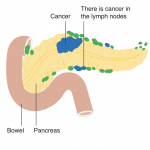
Cancer Research UK, CC BY-SA 4.0 via Wikimedia Commons
Pancreatic cancer, while rare, is one of the most lethal cancers because the symptoms usually appear at a late stage, and the pancreas’ location makes it challenging to feel any tumors during routine exams.
In a promising pilot study, a new screening tool was able to identify more than 95% of stage I pancreatic cancers from blood samples.The researchers created the new tool based on the knowledge that tumors release small extracellular vesicles containing tumor proteins into the blood.
The tool can predict the probability of being malignant by using the results from blood samples in conjunction with artificial intelligence. Predicting malignancy at an early stage lays the foundation for more effective cancer treatment. The study is published in Nature Communications Medicine.
